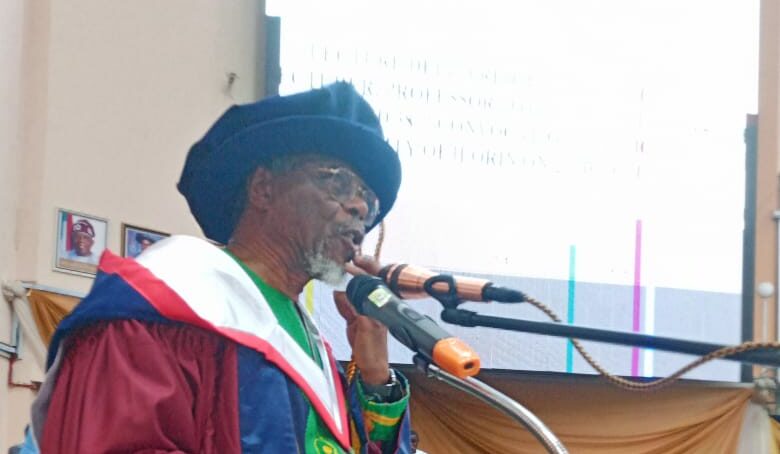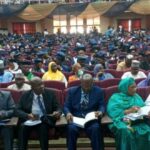A renowned historian and professor of history at the University of Texas, USA, Toyin Falola, has said that traditional values should not be relegated just because the country embraces modernity and modernisation.
The historian gave the piece of advice in his convocation lecture delivered at the 37th and 38th combined convocation ceremonies of the University of Ilorin on Friday, saying that with this, the country would not lose values beneficial to its social and economic life.
According to him, such values, which include respect for elders and respect for family’s integrity, would make people virtuous, curb corruption, and discourage the internet fraud that modern technology produces.
He submitted that it was because the values of respect for self and family are no longer promoted as they used to be in the cultures of the people of the country. He noted that this has rendered the nation highly corrupt, despite being religious.
“See the contradiction: Nigeria is one of the most religious nations in the world, yet one of the most corrupt. This means that something is not correct,” he stated.
Falola, however, pointed out some areas where he said the growth of the nation’s economy had been aided by the promotion of the nation’s social-cultural values. He added that the transformation of the nation’s film industry and the booming of the fashion industry aided the economy.
“When Nigeria recalibrated its economy to become the biggest in Africa, it was made possible by what we call a cultural economy, where we transformed Nollywood into the third best in the world and the fashion industry into one of the best in the world,” he stated.
Speaking on the challenges of modernization, he noted that “the relentless progression of modernization across the global terrain, closely observed in the burgeoning advancements within the African continent, especially in Nigeria, is fraught with its impediments. At the forefront of contemporary observation, one sees Nigeria grappling with the multifaceted challenges that often accompany such expeditious transformation
“This profound transformation witnessed the rapid growth of urban areas, attracting large numbers of individuals in pursuit of economic opportunities. Consequently, this phenomenon instigated a shift from communal living arrangements to smaller, nuclear family units, accompanied by the adoption of new labour patterns and the emergence of a society stratified along class lines.
“However, this transition represents more than just a linear progression; it constitutes a profound transformation in the fundamental essence of human existence, exerting an influence on cultural narratives, social structures, and individual belief systems. With the advent of societal modernization, the cohesive and revered sacred canopy that once enveloped traditional societies underwent fragmentation. Consequently, a paradigm shift occurred, where rationality emerged as the fundamental pillar of human existence. This transformation entailed a departure from the cosmic and cyclical perspective on life, embracing a linear and progressive outlook that placed great value on novelty, change, and advancement. This transition nonetheless introduced a multitude of intricacies, blurring the demarcation between the sacred and the secular and fostering an environment characterised by an incessant pursuit of significance and selfhood.
“Moreover, the societal shift towards modernity signifies a significant transformation in human principles and ethical orientations. The advent of modernity, with a prioritisation of individualism, marked a gradual but noticeable transition from a collective consciousness to one of personal autonomy. This transformation fostered a social context where individual ambitions and accomplishments took precedence over communal objectives.
The aforementioned transition, characterised by the promotion of ingenuity and individual development, concurrently ushered in an era of unparalleled intricacy. In this new paradigm, individuals, liberated from the constraints of collective norms, embarked upon an unceasing pursuit of self-actualization and significance in a society that appeared increasingly fragmented and disconnected.
“As we engage in a more profound exploration of this narrative, it becomes apparent that the shift from a traditional to a contemporary society is not merely a historical occurrence but rather a multifaceted and intricate progression that continues to profoundly influence our global landscape in diverse manners. It serves as a testament to humanity’s remarkable capacity for innovation and flexibility, providing a dynamic depiction of the fundamental nature of human development in its most vibrant and revolutionary form. Despite the challenges we face in this endeavour, it points towards a forthcoming era where the limits of what can be achieved are perpetually broadening. This fosters a global sphere that, in its perpetual state of flux, holds the potential for unparalleled advancement, ingenuity, and affluence.
“The relentless force of modernization can overpower the subtle complexities of indigenous knowledge systems, leading to a society that grapples with existential dilemmas and the imminent risk of forfeiting its cultural opulence and multiplicity.”
He further argued that this modernization drive in value systems is noticeable in various sectors of society. “This transition is not isolated but resonates with a wider African discourse where nations are striving to establish sustainable and inclusive economic trajectories that align with the dynamics of a globalised economy. Nonetheless, this transition process presents a distinct set of challenges, such as the exacerbation of income inequalities and the arduous task of establishing robust infrastructural systems capable of supporting this economic metamorphosis. This similar phenomenon is observed in analogous emerging economies across the globe.
“In the realm of technological advancements, Nigeria resonates with a dynamic cadence, embodying a population adept in digital literacy and interconnectedness. The rise of mobile technology and the internet has brought about a profound transformation in how Nigerians communicate, access information, and engage with the global community. Within the contemporary digital milieu, an ongoing process shapes societal values, fostering a deep appreciation for information, connectivity, and innovation. The advent of this technological revolution has not only democratised information but has also created novel channels for cultural expression, education, and economic prospects. This narrative reflects a larger global phenomenon in which technology wields significant influence on societal values, promoting qualities such as adaptability, innovation, and a global perspective.
“In the realm of politics, the ongoing processes of modernization are guiding the nation along a trajectory characterised by its intricate nature and potential for profound transformation. The introduction of democracy has brought about a significant shift, supplanting an era marked by prolonged military rule and cultivating a political milieu that prioritizes values such as participation, inclusivity, and representation. This transformation emphasised accountability, dialogue, and effective governance in the political landscape. Furthermore, the contemporary political scene in Nigeria is defined by the active involvement of the younger generation, who are progressively asserting their viewpoints, advocating for transformative measures, and influencing the political dialogue. This trend is also observed in various African countries striving to uphold democratic ideals and principles. Nevertheless, this journey is characterized by inherent paradoxes as the nation grapples with the intricacies of corruption, governance, and the task of forging a cohesive national identity within a heterogeneous, multi-ethnic populace.”
In his speech at the occasion, the Vice Chancellor of the university, Professor Wahab Egbewole, urged both the federal and state governments to declare a state of emergency in the university education sector to address the problem of brain drain, which he said was affecting the sector.
Egbewole felicitated the graduating students as he expressed confidence that they would make an impact in their respective fields.
READ ALSO FROM NIGERIAN TRIBUNE






